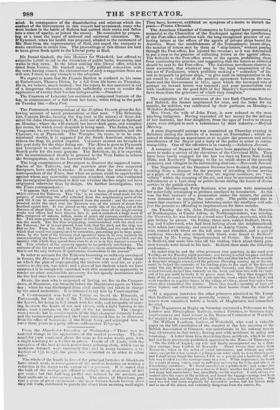From the Manchester Guardian of Wednesdavee" There was no material
change in the appearance of the market yesterday. The de- mand for yarn continued about the same as for some weeks past, with a slight tendency to a doeline in prices. (foods of all kinds, with the exception of the best 27-inelt power-loom printing-cloth, which was hi moderate demand, were extremely flat ; and in many instances a re- duction of I d. to3.14. the piece was submitted to in order to effect sales."
The whole of the hands in five of the principal factories at Blackburn have struck work., in consetplence of the masters insisting on making a reduction in the is ages to the extent of :se per cent. It is stated that the bulk of' the workpeople offered t i I lonit to an abatement of five per cent. ; but this half-way proffer we's refused by the monsters, and their mills are in core-elm:nee closed. The streets of' Blackburn pre- Lout a scene of great excitement ; the poor thetory-hands having, since they left work, contieued to parade the street from morning until night.
They have, however, exhibited no symptom of a desire to disturb the
peace.—Preston Chronicle.
The American Chamber of Commerce in Liverpool have presented a memorial to the Chancellor of the Exchequer against the interference of the Post-office authorities with the long-recognized practice of col- lecting letters at the offices of the agents of private ships bound for America. Since the establishment of the Transatlantic steam-ships, the number of letters sent by them as " ship-letters," without passing through the Post-office, has injured the revenue; so it was determined to put a stop to the practice of collecting letters at the agents' offices. The Solicitor to the Post-office wrote to the agents, prohibiting them from continuing the practice, and suggesting that the letters so collected should be sent to the Post-office. The American merchants observe in their memorial, that whatever may be the legal construction of the late act of Parliament, which prohibits making a " collection" of let- ters to despatch by private ships, " to give such an interpretation to the act would be a violation of the positive agreement between the mer- heats and the Government in 1815, upon which the increased rate of postage on inward letters was imposed; and your memorialists rely with confidence on the good faith of her Majesty's Government to re- lieve them from the grievance of which they complain."


























 Previous page
Previous page